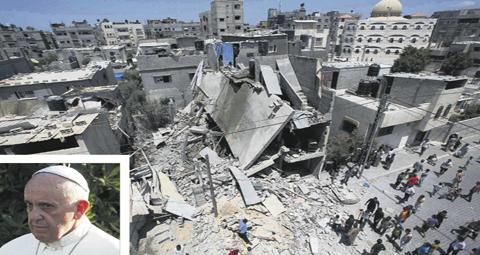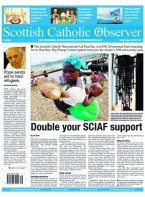BY Ian Dunn | July 18 2014 | ![]() 0 COMMENTS
0 COMMENTS ![]() print
print

‘Break cycle of hatred and violence’
Publication Date: 2014-07-18
POPE Francis appeals for peace in the Holy Land as conflict in the region rumbles on
Pope Francis has made an urgent appeal for peace in the Holy Land after violence flared in the troubled region again this week.
“I extend a heartfelt appeal to all of you to continue to pray earnestly for peace in the Holy Land, in light of the tragic events of recent days,” the Holy Father said after more than 200 casualties were reported in the past week. Recalling the June 8 invocation for peace with the Israeli and Palestinian presidents, the Pope (above inset) recounted how they ‘invoked the gift of peace and heard the call to break the cycle of hatred and violence.’
“Some might think that such a meeting took place in vain, but no, because prayer helps us not to allow ourselves to be overcome by evil, nor resign ourselves to violence and hatred taking over dialogue and reconciliation,” the Pope said. “I urge the parties concerned and all those who have political responsibility at local and international levels to spare a prayer and make some effort to put an end to all hostilities and to achieve the desired peace for the good of all.”
Prayers for peace
Pope Francis then invited the thousands present in St Peter’s Square to unite in prayer and led the masses in a moment of silent prayer for the Holy Land.
Following the prayerful moment of silence, Pope Francis prayed ‘Now, Lord, help us! Grant us peace, teach us peace, guide us toward peace.’
He asked that the Lord give to all the strength and courage ‘to take concrete actions to build peace… make us willing to listen to the cry of our citizens who are asking us to transform our weapons into instruments of peace, our fears into trust, and our tensions into forgiveness.’
Conflict
Tensions between Israel and Palestine have steadily increased in recent weeks following the murder of three Israeli teenagers, whose bodies were discovered on June 30. On the day of their funeral, the body of a Palestinian teenager was found, whose death is seen as a retaliation killing.
Israel and Palestinian organisation Hamas, whom Israeli Prime Minister Benjamin Netanyahu has faulted for the murder of the three Jewish teenagers, have continued to exchange fire in the Gaza area, despite a proposed ceasefire last week.
Health officials in Gaza report that at least 200 Palestinians have been killed since air strikes from Israel began, including numerous civilians.
A priest at the Gaza Strip’s only Catholic parish said the tiny Christian community in the Gaza Strip have been keeping tabs on each other and lending a helping hand to keep each other safe during Israeli air strikes throughout the region, but nowhere in the territory is really safe.
Fr Jorge Hernandez, an Argentine member of the Institute of the Incarnate Word, said that one night, after a bomb siren sounded, he helped three Sisters of Charity evacuate 20 handicapped children from their home to his.
“We had to carry all the children in our arms,” Fr Hernandez said. “There is no space in my house, so we laid down blankets on the floor and put the
children there. It was very intense and there was a lot of fear, but the bomb fell farther away.”
Air strikes
Israel has claimed that its air strikes in populated areas (above main) are targeted to the homes of militants, and they give phone warnings to all civilians in the house to leave the premises before attacking. The air strikes began on July 8.
Fr Hernandez said that three Gaza neighbourhoods had been warned to evacuate, but there are no safety zones large enough for all the residents. Instead, the people seek refuge in government and UN run school buildings, he said.
“Everything is so close; there is no place for them to go,” he said. “There are 100,000 people who have been told to leave, and then there is the problem of food and water for them. It is an enormous problem.”
Some 1300 Christian Palestinians now live in Gaza amid 1.8 million Muslims, with 130 Catholics, a sprinkling of Baptists and a large majority of Greek Orthodox.











